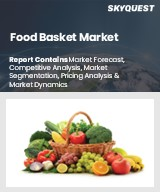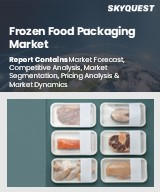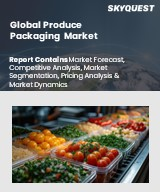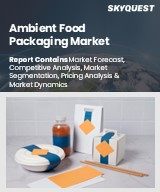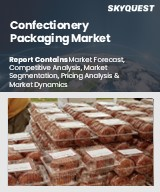
|
시장보고서
상품코드
1679292
스마트 식물 유래 식품 포장 시장 예측(-2030년) : 포장 유형, 재료, 기술, 용도, 지역별 세계 분석Smart Plant-Based Food Packaging Market Forecasts to 2030 - Global Analysis By Packaging Type (Single-Use and Reusable), Material, Technology, Application and By Geography |
||||||
Stratistics MRC에 따르면 세계의 스마트 식물 유래 식품 포장 시장은 예측 기간 중 CAGR 9.0%로 성장하고 있습니다. '스마트 식물 기반 식품 포장'이라는 용어는 식품의 품질, 안전성 및 보존성을 향상시키는 영리한 기능을 포함하여 지속가능한 식물 자원으로 만든 창의적인 포장 옵션을 나타냅니다. 옥수수 전분, 사탕수수 전분, 바가스, 성형 섬유와 같은 생분해성 및 퇴비화 가능한 재료는 기존 플라스틱 포장에 비해 환경에 미치는 영향을 크게 줄입니다. 신선도, 온도, 부패 가능성 등 식품의 상태는 스마트 식물성 포장에 내장된 센서와 표시기를 통해 추적 및 전달됩니다. 식물성 스마트 식품 포장은 지속가능성과 첨단 기능성을 결합하여 친환경적이고 지능적인 포장 솔루션에 대한 수요 증가에 부응하고 순환 경제를 지원합니다.
세계식량기구에 따르면 전 세계 식량의 1/3이 버려지고 있으며, 이 버려지는 식량의 대부분은 소매업체와 소비자에 의해 만들어지고 있습니다.
지속가능하고 친환경적인 포장에 대한 수요 증가
환경에 대한 인식이 높아짐에 따라 고객들은 일반 플라스틱 포장을 대체할 수 있는 퇴비화 및 생분해성 포장을 원하고 있습니다. 이러한 고객 선호도의 변화로 인해 재생한 자원에서 유래하고 이산화탄소 배출량이 적은 식물성 포장재가 점점 더 인기를 얻고 있습니다. 또한 친환경 포장 옵션에 대한 요구는 정부의 엄격한 법규와 일회용 플라스틱 금지로 인해 시장 성장을 가속하고 있습니다.
기존 포장에 비해 높은 제조 비용
식물 유래 포장에 사용되는 두 가지 기본 재료인 천연섬유와 바이오폴리머는 특수한 가공 방법이 자주 필요하므로 기존 플라스틱 대체품에 비해 비용이 더 높습니다. 또한 지속가능한 포장재를 대규모로 생산하는 데 필요한 인프라가 아직 개발 중이기 때문에 생산 비용이 상승하고 있습니다. 식물성 포장재의 내구성과 내습성을 향상시키기 위해서는 추가적인 처리가 필요할 수 있으며, 이는 시장 성장을 더욱 저해하는 비용 상승 요인으로 작용할 수 있습니다.
스마트 및 지능형 포장의 기술 혁신 증가
기술 개발로 인해 식품의 보호 및 보존 외에도 추가적인 기능을 제공하는 포장 솔루션의 개발이 가능해졌습니다. 예를 들어 스마트 포장에는 고객과의 상호 작용 및 추적성을 위한 QR코드와 식품의 품질과 신선도를 추적하는 센서가 포함될 수 있습니다. 식물 유래 재료와 능동적이고 지능적인 포장 기술의 결합은 전체 가치 제안을 향상시키고 새로운 시장 기회를 제공합니다.
산업용 퇴비화 및 폐기물 관리의 과제
식물 유래 포장재는 종종 산업용 퇴비화 시설을 필요로 하지만, 그 시설이 항상 쉽게 이용할 수 있는 것은 아닙니다. 생분해성 포장재의 환경적 이점은 폐기물 관리 시스템이 미흡한 지역에서는 매립지로 전락할 수 있으므로 감소할 수 있습니다. 또한 규제된 라벨링과 적절한 폐기 방법에 대한 소비자의 지식이 부족하여 재활용 흐름이 오염될 수 있습니다. 폐기물 관리 규정과 인프라가 적절한 지원을 제공하지 않는다면, 식물성 포장재의 잠재력을 충분히 발휘하지 못할 수 있습니다.
COVID-19의 영향
COVID-19 팬데믹으로 인해 스마트한 식물성 식품 포장의 인기가 높아지고 있습니다. 지속가능성과 청결에 대한 고객의 관심이 높아짐에 따라 안전하고 환경적으로 적합한 포장재를 선택해야 할 필요성이 높아졌습니다. 플라스틱 폐기물을 줄이기 위한 노력의 일환으로, 식품 배달 서비스 및 잠금식 E-Commerce 증가는 식물성 대체품으로의 전환을 가속화하고 있습니다. 하지만 초기에는 공급망 중단과 원자재 부족으로 인해 생분해성 포장재의 가용성에 영향을 미쳤습니다.
예측 기간 중 재사용 가능한 부문이 가장 클 것으로 예상됩니다.
재사용 가능한 부문은 환경적 이점과 비용 효율성으로 인해 예측 기간 중 가장 큰 시장 점유율을 차지할 것으로 예상됩니다. 이러한 포장 옵션은 여러 번 사용할 수 있으므로 일회용 플라스틱의 필요성을 줄이고 폐기물을 최소화할 수 있습니다. 플라스틱 오염 감소의 중요성에 대한 인식이 높아지고 순환 경제 원칙을 채택하면서 재사용 가능한 포장재에 대한 수요가 증가하여 시장 성장을 가속하고 있습니다.
생분해성 포장 분야는 예측 기간 중 가장 높은 CAGR을 보일 것으로 예상됩니다.
예측 기간 중 생분해성 포장 분야는 식품 및 음료 산업에서 지속가능한 포장 솔루션에 대한 수요가 증가함에 따라 생분해성 포장의 채택이 증가함에 따라 가장 높은 성장률을 보일 것으로 예상됩니다. 기술 발전과 새로운 생분해성 소재의 개발은 그 성능과 시장 잠재력을 더욱 향상시키고 있습니다. 친환경 제품에 대한 소비자의 선호도 증가와 플라스틱 폐기물에 대한 엄격한 규제 시행도 빠른 성장에 기여하고 있습니다.
가장 큰 점유율을 차지하는 지역
예측 기간 중 아시아태평양은 식품 및 음료 산업의 성장, 도시화, 지속가능성에 대한 소비자의 인식 증가로 인해 가장 큰 시장 점유율을 차지할 것으로 예상됩니다. 중국, 인도, 일본과 같은 국가들은 정부 정책과 친환경 기술에 대한 투자에 힘입어 식물 유래 포장 솔루션의 채택을 주도하고 있습니다. 중산층 인구 증가와 포장 및 가공식품에 대한 수요 증가가 시장을 더욱 견인하고 있습니다.
CAGR이 가장 높은 지역:
예측 기간 중 북미가 가장 높은 CAGR을 보일 것으로 예상됩니다. 이는 주요 식물 유래 포장 제조업체의 존재와 스마트 포장 솔루션의 채택 확대가 북미 시장의 성장을 주도하고 있기 때문입니다. 또한 정부의 구상과 기업의 지속가능성 목표는 친환경 포장 옵션의 사용을 장려하고 있습니다. 포장 식품 및 음료에 대한 수요 증가와 플라스틱 폐기물 감소에 대한 관심은 이 지역 시장 확대를 더욱 촉진하고 있습니다.
무료 커스터마이징 서비스:
이 보고서를 구독하는 고객은 다음과 같은 무료 맞춤화 옵션 중 하나를 이용할 수 있습니다.
- 기업소개
- 추가 시장 기업의 종합 프로파일링(최대 3사)
- 주요 기업의 SWOT 분석(최대 3사)
- 지역 세분화
- 고객의 관심에 따른 주요 국가별 시장 추정, 예측, CAGR(주: 타당성 확인에 따라 다름)
- 경쟁사 벤치마킹
- 제품 포트폴리오, 지역적 입지, 전략적 제휴에 기반한 주요 기업의 벤치마킹
목차
제1장 개요
제2장 서문
- 개요
- 이해관계자
- 조사 범위
- 조사 방법
- 데이터 마이닝
- 데이터 분석
- 데이터 검증
- 조사 어프로치
- 조사 정보원
- 1차 조사 정보원
- 2차 조사 정보원
- 전제조건
제3장 시장 동향 분석
- 촉진요인
- 억제요인
- 기회
- 위협
- 기술 분석
- 용도 분석
- 신흥 시장
- COVID-19의 영향
제4장 Porter's Five Forces 분석
- 공급 기업의 교섭력
- 바이어의 교섭력
- 대체품의 위협
- 신규 진출업체의 위협
- 경쟁 기업 간 경쟁 관계
제5장 세계의 스마트 식물 유래 식품 포장 시장 : 포장 유형별
- 일회용
- 재사용 가능
제6장 세계의 스마트 식물 유래 식품 포장 시장 : 재료별
- 종이·판지
- 바이오플라스틱
- 금속
- 유리
- 플라스틱 폴리머와 나노복합재료
- 기타 재료
제7장 세계의 스마트 식물 유래 식품 포장 시장 : 기술별
- 생분해성 포장
- 무균 포장
- 제어 포장과 활성포장
- 지능형 포장
- 가스 치환 포장
- 기타 기술
제8장 세계의 스마트 식물 유래 식품 포장 시장 : 용도별
- 유제품
- 육류·씨푸드
- 베이커리 제품
- 제과 제품
- 기타 용도
제9장 세계의 스마트 식물 유래 식품 포장 시장 : 지역별
- 북미
- 미국
- 캐나다
- 멕시코
- 유럽
- 독일
- 영국
- 이탈리아
- 프랑스
- 스페인
- 기타 유럽
- 아시아태평양
- 일본
- 중국
- 인도
- 호주
- 뉴질랜드
- 한국
- 기타 아시아태평양
- 남미
- 아르헨티나
- 브라질
- 칠레
- 기타 남미
- 중동 및 아프리카
- 사우디아라비아
- 아랍에미리트
- 카타르
- 남아프리카공화국
- 기타 중동 및 아프리카
제10장 주요 발전
- 계약, 파트너십, 협업, 합병사업
- 인수와 합병
- 신제품 발매
- 사업 확대
- 기타 주요 전략
제11장 기업 프로파일링
- Ball Corporation
- Bemis Company
- Cascade Marine Foods LLC
- Coca-Cola
- Constar International Inc
- Crown Holdings, Inc
- ECNOW TECH
- Filtration Group Corporation
- Graham Packaging Company
- Heinz
- Insignia Technologies
- KENCKO
- Milky Mist Dairy
- National Beef Packaging Company
- PPC Flexible Packaging
- SINTEF
- Sysco Corporation
According to Stratistics MRC, the Global Smart Plant-Based Food Packaging Market is growing at a CAGR of 9.0% during the forecast period. The term "smart plant-based food packaging" describes creative packaging options made from sustainable plant sources that include clever features to improve food quality, safety, and shelf life. When compared to conventional plastic packaging, the environmental effect of these biodegradable and compostable materials such as cornstarch, bagasse, and molded fiber is greatly reduced. Food conditions including freshness, temperature, and possible spoiling are tracked and communicated by sensors and indicators integrated into smart plant-based packaging. Smart plant-based food packaging answers the rising need for environmentally friendly and intelligent packaging solutions by fusing sustainability with cutting-edge functionality, therefore supporting the circular economy.
According to the Agriculture and Food Organization, one third of the food in the world is wasted and most of this wasted food is generated by retailers and consumers.
Market Dynamics:
Driver:
Rising demand for sustainable & eco-friendly packaging
Customers are looking for compostable and biodegradable alternatives to typical plastic packaging as they become more conscious of its negative environmental effects. Plant-based packaging materials which come from renewable resources and have a smaller carbon footprint are becoming more and more popular as a result of this change in customer tastes. The need for environmentally friendly packaging options is also being fueled by strict government laws and prohibitions on single-use plastics boosting the market growth.
Restraint:
High production costs compared to conventional packaging
Natural fibers and bio-based polymers, two basic materials used in plant-based packaging, frequently need specific processing methods, which raises their cost relative to more conventional plastic substitutes. Furthermore, the infrastructure needed to produce sustainable packaging on a big scale is still being developed, which raises the cost of manufacturing. Additional treatments may be necessary to improve the plant-based packaging materials' durability and moisture resistance, which would raise costs even more impeding the market growth.
Opportunity:
Growing innovation in smart & intelligent packaging
Technological developments are making it possible to create packaging solutions that offer extra features in addition to protecting and preserving food. For instance, smart packaging might include QR codes for customer interaction and traceability, as well as sensors to track the quality and freshness of food. Plant-based materials combined with active and intelligent packaging technologies improve the entire value proposition and provide new market opportunities.
Threat:
Challenges in industrial composting & waste management
Lot of plant-based packaging materials frequently need industrial composting facilities, which are not always accessible. The environmental benefits of biodegradable packaging may be diminished in areas with inadequate waste management systems as it may still wind up in landfills. Recycling streams may also get contaminated due to a lack of regulated labeling and consumer knowledge of appropriate disposal techniques. The full potential of plant-based packaging could not be achieved if waste management regulations and infrastructure do not provide adequate assistance.
Covid-19 Impact
Smart plant-based food packaging has become increasingly popular as a result of the Covid-19 epidemic. As customers' worries about sustainability and cleanliness grew, so did the need for safe and environmentally appropriate packaging choices. of an effort to limit plastic waste, the rise of food delivery services and e-commerce during lockdowns hastened the transition to plant-based substitutes. Initially, nevertheless, the availability of biodegradable packaging materials was impacted by supply chain interruptions and shortages of raw goods.
The reusable segment is expected to be the largest during the forecast period
The reusable segment is expected to account for the largest market share during the forecast period due to their environmental benefits and cost-effectiveness. These packaging options can be used multiple times, reducing the need for single-use plastics and minimizing waste. The growing awareness about the importance of reducing plastic pollution and the adoption of circular economy principles are driving the demand for reusable packaging thus propelling the growth of the market.
The biodegradable packaging segment is expected to have the highest CAGR during the forecast period
Over the forecast period, the biodegradable packaging segment is predicted to witness the highest growth rate owing to growing demand for sustainable packaging solutions in the food and beverage industry is driving the adoption of biodegradable packaging. Technological advancements and the development of new biodegradable materials are further enhancing their performance and market potential. The increasing consumer preference for eco-friendly products and the implementation of stringent regulations on plastic waste are also contributing to the rapid growth.
Region with largest share:
During the forecast period, the Asia Pacific region is expected to hold the largest market share driven by the expanding food and beverage industry, rising urbanization, and increasing consumer awareness about sustainability. Countries like China, India, and Japan are leading the adoption of plant-based packaging solutions, supported by government policies and investments in green technologies. The growing middle-class population and the increasing demand for packaged and processed food products further drive market.
Region with highest CAGR:
Over the forecast period, the North America region is anticipated to exhibit the highest CAGR due to the presence of major plant-based packaging manufacturers and the growing adoption of smart packaging solutions drive the market growth in North America. Additionally, government initiatives and corporate sustainability goals are encouraging the use of eco-friendly packaging options. The increasing demand for packaged food and beverages, coupled with the focus on reducing plastic waste, further supports the market expansion in this region
Key players in the market
Some of the key players in Smart Plant-Based Food Packaging market include Ball Corporation, Bemis Company, Cascade Marine Foods LLC, Coca-Cola, Constar International Inc, Crown Holdings, Inc, ECNOW TECH, Filtration Group Corporation, Graham Packaging Company, Heinz, Insignia Technologies, KENCKO, Milky Mist Dairy, National Beef Packaging Company PPC Flexible Packaging, SINTEF and Sysco Corporation.
Key Developments:
In January 2025, PPC Flex launched revamped website, elevating user experience amidst brand refresh and is proud to announce the official launch of its redesigned website, marking a significant milestone in the company's ongoing brand refresh and commitment to delivering excellence in user experience.
In December 2024, Cascade Marine Foods LLC announced expansion into sustainable seafood sourcing, further strengthening commitment to quality and ocean health. Its dedication to environmentally responsible practices while maintaining the highest quality standards for its customers.
In November 2024, Coca-Cola Company announced that innocent Drinks and Costa Coffee will report to the company's Europe operating unit, effective. These organizational changes are intended to streamline and simplify the current structure. There are no significant numbers of employment changes, as the vast majority of current roles will continue.
Packaging Types Covered:
- Single-Use
- Reusable
Materials Covered:
- Papers & Paperboard
- Bioplastics
- Metal
- Glass
- Plastic Polymer & Nano Composites
- Other Materials
Technologies Covered:
- Biodegradable Packaging
- Aseptic Packaging
- Controlled Packaging & Active Packaging
- Intelligent Packaging
- Modified Atmosphere Packaging
- Other Technologies
Applications Covered:
- Dairy Products
- Meat & Seafood
- Bakery Products
- Confectionary Products
- Other Applications
Regions Covered:
- North America
- US
- Canada
- Mexico
- Europe
- Germany
- UK
- Italy
- France
- Spain
- Rest of Europe
- Asia Pacific
- Japan
- China
- India
- Australia
- New Zealand
- South Korea
- Rest of Asia Pacific
- South America
- Argentina
- Brazil
- Chile
- Rest of South America
- Middle East & Africa
- Saudi Arabia
- UAE
- Qatar
- South Africa
- Rest of Middle East & Africa
What our report offers:
- Market share assessments for the regional and country-level segments
- Strategic recommendations for the new entrants
- Covers Market data for the years 2022, 2023, 2024, 2026, and 2030
- Market Trends (Drivers, Constraints, Opportunities, Threats, Challenges, Investment Opportunities, and recommendations)
- Strategic recommendations in key business segments based on the market estimations
- Competitive landscaping mapping the key common trends
- Company profiling with detailed strategies, financials, and recent developments
- Supply chain trends mapping the latest technological advancements
Free Customization Offerings:
All the customers of this report will be entitled to receive one of the following free customization options:
- Company Profiling
- Comprehensive profiling of additional market players (up to 3)
- SWOT Analysis of key players (up to 3)
- Regional Segmentation
- Market estimations, Forecasts and CAGR of any prominent country as per the client's interest (Note: Depends on feasibility check)
- Competitive Benchmarking
- Benchmarking of key players based on product portfolio, geographical presence, and strategic alliances
Table of Contents
1 Executive Summary
2 Preface
- 2.1 Abstract
- 2.2 Stake Holders
- 2.3 Research Scope
- 2.4 Research Methodology
- 2.4.1 Data Mining
- 2.4.2 Data Analysis
- 2.4.3 Data Validation
- 2.4.4 Research Approach
- 2.5 Research Sources
- 2.5.1 Primary Research Sources
- 2.5.2 Secondary Research Sources
- 2.5.3 Assumptions
3 Market Trend Analysis
- 3.1 Introduction
- 3.2 Drivers
- 3.3 Restraints
- 3.4 Opportunities
- 3.5 Threats
- 3.6 Technology Analysis
- 3.7 Application Analysis
- 3.8 Emerging Markets
- 3.9 Impact of Covid-19
4 Porters Five Force Analysis
- 4.1 Bargaining power of suppliers
- 4.2 Bargaining power of buyers
- 4.3 Threat of substitutes
- 4.4 Threat of new entrants
- 4.5 Competitive rivalry
5 Global Smart Plant-Based Food Packaging Market, By Packaging Type
- 5.1 Introduction
- 5.2 Single-Use
- 5.3 Reusable
6 Global Smart Plant-Based Food Packaging Market, By Material
- 6.1 Introduction
- 6.2 Papers & Paperboard
- 6.3 Bioplastics
- 6.4 Metal
- 6.5 Glass
- 6.6 Plastic Polymer & Nano Composites
- 6.7 Other Materials
7 Global Smart Plant-Based Food Packaging Market, By Technology
- 7.1 Introduction
- 7.2 Biodegradable Packaging
- 7.3 Aseptic Packaging
- 7.4 Controlled Packaging & Active Packaging
- 7.5 Intelligent Packaging
- 7.6 Modified Atmosphere Packaging
- 7.7 Other Technologies
8 Global Smart Plant-Based Food Packaging Market, By Application
- 8.1 Introduction
- 8.2 Dairy Products
- 8.3 Meat & Seafood
- 8.4 Bakery Products
- 8.5 Confectionary Products
- 8.6 Other Applications
9 Global Smart Plant-Based Food Packaging Market, By Geography
- 9.1 Introduction
- 9.2 North America
- 9.2.1 US
- 9.2.2 Canada
- 9.2.3 Mexico
- 9.3 Europe
- 9.3.1 Germany
- 9.3.2 UK
- 9.3.3 Italy
- 9.3.4 France
- 9.3.5 Spain
- 9.3.6 Rest of Europe
- 9.4 Asia Pacific
- 9.4.1 Japan
- 9.4.2 China
- 9.4.3 India
- 9.4.4 Australia
- 9.4.5 New Zealand
- 9.4.6 South Korea
- 9.4.7 Rest of Asia Pacific
- 9.5 South America
- 9.5.1 Argentina
- 9.5.2 Brazil
- 9.5.3 Chile
- 9.5.4 Rest of South America
- 9.6 Middle East & Africa
- 9.6.1 Saudi Arabia
- 9.6.2 UAE
- 9.6.3 Qatar
- 9.6.4 South Africa
- 9.6.5 Rest of Middle East & Africa
10 Key Developments
- 10.1 Agreements, Partnerships, Collaborations and Joint Ventures
- 10.2 Acquisitions & Mergers
- 10.3 New Product Launch
- 10.4 Expansions
- 10.5 Other Key Strategies
11 Company Profiling
- 11.1 Ball Corporation
- 11.2 Bemis Company
- 11.3 Cascade Marine Foods LLC
- 11.4 Coca-Cola
- 11.5 Constar International Inc
- 11.6 Crown Holdings, Inc
- 11.7 ECNOW TECH
- 11.8 Filtration Group Corporation
- 11.9 Graham Packaging Company
- 11.10 Heinz
- 11.11 Insignia Technologies
- 11.12 KENCKO
- 11.13 Milky Mist Dairy
- 11.14 National Beef Packaging Company
- 11.15 PPC Flexible Packaging
- 11.16 SINTEF
- 11.17 Sysco Corporation







